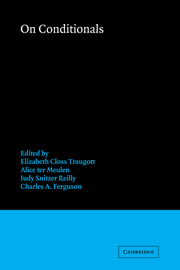Book contents
- Frontmatter
- Contents
- Contributors
- Preface
- Acknowledgments
- PART I GENERAL STUDIES
- PART II PARTICULAR STUDIES
- 5 ON THE INTERPRETATION OF ‘DONKEY’-SENTENCES
- 6 GENERIC INFORMATION, CONDITIONAL CONTEXTS AND CONSTRAINTS
- 7 DATA SEMANTICS AND THE PRAGMATICS OF INDICATIVE CONDITIONALS
- 8 REMARKS ON THE SEMANTICS AND PRAGMATICS OF CONDITIONALS
- 9 THE USE OF CONDITIONALS IN INDUCEMENTS AND DETERRENTS
- 10 CONDITIONALS AND SPEECH ACTS
- 11 CONSTRAINTS ON THE FORM AND MEANING OF THE PROTASIS
- 12 CONDITIONALS, CONCESSIVE CONDITIONALS AND CONCESSIVES: AREAS OF CONTRAST, OVERLAP AND NEUTRALIZATION
- 13 THE REALIS–IRREALIS CONTINUUM IN THE CLASSICAL GREEK CONDITIONAL
- 14 THE HISTORICAL DEVELOPMENT OF si-CLAUSES IN ROMANCE
- 15 FIRST STEPS IN ACQUIRING CONDITIONALS
- 16 THE ACQUISITION OF TEMPORALS AND CONDITIONALS
- 17 CONDITIONALS ARE DISCOURSE-BOUND
- 18 CONDITIONALS IN DISCOURSE: A TEXT-BASED STUDY FROM ENGLISH
- Index of names
- Index of languages
- Index of subjects
6 - GENERIC INFORMATION, CONDITIONAL CONTEXTS AND CONSTRAINTS
Published online by Cambridge University Press: 04 August 2010
- Frontmatter
- Contents
- Contributors
- Preface
- Acknowledgments
- PART I GENERAL STUDIES
- PART II PARTICULAR STUDIES
- 5 ON THE INTERPRETATION OF ‘DONKEY’-SENTENCES
- 6 GENERIC INFORMATION, CONDITIONAL CONTEXTS AND CONSTRAINTS
- 7 DATA SEMANTICS AND THE PRAGMATICS OF INDICATIVE CONDITIONALS
- 8 REMARKS ON THE SEMANTICS AND PRAGMATICS OF CONDITIONALS
- 9 THE USE OF CONDITIONALS IN INDUCEMENTS AND DETERRENTS
- 10 CONDITIONALS AND SPEECH ACTS
- 11 CONSTRAINTS ON THE FORM AND MEANING OF THE PROTASIS
- 12 CONDITIONALS, CONCESSIVE CONDITIONALS AND CONCESSIVES: AREAS OF CONTRAST, OVERLAP AND NEUTRALIZATION
- 13 THE REALIS–IRREALIS CONTINUUM IN THE CLASSICAL GREEK CONDITIONAL
- 14 THE HISTORICAL DEVELOPMENT OF si-CLAUSES IN ROMANCE
- 15 FIRST STEPS IN ACQUIRING CONDITIONALS
- 16 THE ACQUISITION OF TEMPORALS AND CONDITIONALS
- 17 CONDITIONALS ARE DISCOURSE-BOUND
- 18 CONDITIONALS IN DISCOURSE: A TEXT-BASED STUDY FROM ENGLISH
- Index of names
- Index of languages
- Index of subjects
Summary
Editors' note. The semantics of generic statements in conditional contexts is addressed, and a model-theoretic analysis is developed in the framework of Situation Semantics. Context-dependent interpretation, including tense and plural anaphora, is discussed for generic and episodic information. The paper is related to Barwise's by the formal framework, and to Reinhart's by addressing anaphora. It analyses Reilly's protogenerics and formulates some specific conditions for the interchangeability of conditionals and temporal adverbs.
INTRODUCTION
This paper is concerned with the semantic interpretation of generic expressions in conditionals and with their interaction with temporal adverbs and tense, assuming Situation Semantics as a general framework for a model-theoretic semantics of natural language. As a theory of meaning and interpretation which attributes to the context of an utterance an important role in its interpretation, this recently developed semantic theory will provide new and fruitful concepts for analysing the use of generics in natural language and their role in structuring meaning as a relation between expressions and situations in the external world. The issues concerning generics are presented as informally as possible at first, to clarify the underlying intuitions. Reilly's notion of ‘protogeneric’ (this volume) is discussed as a form of contextually restricted generic expression and the general question is addressed of the conditions under which when and whenever are interchangeable with the conditional if–then without distortion of meaning. Conditionals and generics are shown to share an important semantic property: persistence of expressed information, or insensitivity to putative counterexamples.
- Type
- Chapter
- Information
- On Conditionals , pp. 123 - 146Publisher: Cambridge University PressPrint publication year: 1986
- 4
- Cited by



